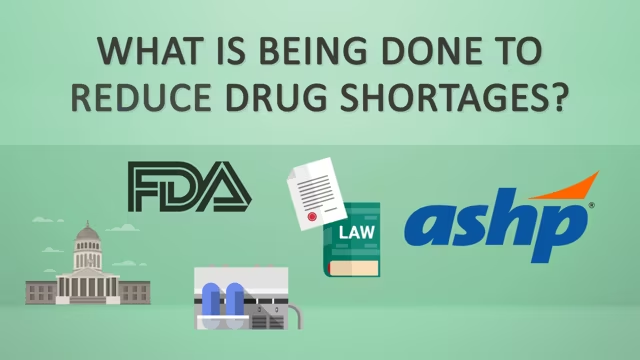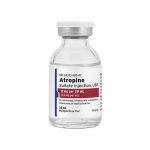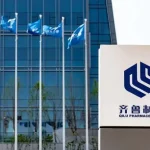FDA and ASHP List 9 New Drugs Facing Critical Shortages

The U.S. FDA and the American Society of Health-System Pharmacists (ASHP) recently made an alarming announcement, adding nine drugs to the already extensive list of medications facing critical shortages. This concerning development has sparked growing concerns within the medical community as patients’ access to essential treatments becomes increasingly uncertain.
Let’s take a closer look at the drugs affected by these shortages, listed in alphabetical order for clarity:
1. Acetylcholine chloride intraocular powder: Patients in need of this medication are facing a challenging situation, as Bausch Health’s Miochol-E 20 milligram vials are currently on back order. The company anticipates that the supply will return to normal in early August, but until then, there are no readily available solutions for those who rely on this drug.
2. Cefdinir oral presentation: The scarcity of this antibiotic is particularly alarming, with only two out of the sixteen commercial solutions currently available. Ascend Therapeutics has managed to allocate five solutions, while Lupin faces four solutions without a clear resupply date. Similarly, Teva Pharmaceuticals offers five solutions, but their release dates range from late July to mid-August, with one solution experiencing intermittent back orders. There is a glimmer of hope, though, as both Lupin and Rising Pharmaceuticals have one solution each that is currently available.
3. Edetate calcium disodium injection: Patients requiring treatment for lead poisoning are now facing a constrained supply situation. This unfortunate situation was triggered by a shortage of the preferred medication, dimercaprol. To add to the complexity, the nation’s only domestic supplier of dimercaprol, Akorn Operating Co. in Gurnee, Ill., ceased its operations in February, exacerbating the problem. Fortunately, Casper Pharma/Rising Pharmaceuticals and BTG International are offering solutions, albeit with some restrictions. Bausch Health, however, does not have solutions available due to “requirements related to complying with good manufacturing practices.”
4. Lisdexamfetamine dimesylate capsule: The shortage of this medication is a result of a temporary delay at Takeda Pharmaceuticals’ contract manufacturing sites. As a result, two out of the thirteen available solutions are currently in short supply. The drugmaker is diligently working to resolve the issue and expects to release the affected solutions by late September. This medication is vital for treating attention-deficit/hyperactivity disorder and binge eating disorder, making the delay especially concerning for patients relying on it for managing their conditions.
5. Methylprednisolone acetate injection: The shortage of this essential rheumatology drug has caused considerable concern within the medical community. Among the sixteen solutions available, many are on allocation, out of stock, or facing short supply issues. Teva Pharmaceuticals’ seven solutions are currently unavailable, and unfortunately, the drugmaker has not provided an estimated recovery date. Pfizer has also faced manufacturing delays, affecting two of its injections, which are not expected to return to normal supply until March 2025. Additionally, NorthStar Rx has six solutions on allocation, and one is currently out of stock. While there are still twenty-three solutions available, the overall scarcity is putting immense strain on patients who rely on this medication for their treatment and well-being.
6. Podofilox topical gel: For patients relying on AbbVie’s Condylox topical gel (0.5%, 3.5-gram tube) for the treatment of genital warts, the situation is concerning as the medication is currently on back order. AbbVie expects to resupply the gel in late July, which brings a glimmer of hope for those affected. However, the temporary unavailability of this crucial medication highlights the need for maintaining a stable supply chain for essential drugs.
7. Rocuronium bromide injection: Anesthesia plays a crucial role in various medical procedures, and the shortage of about half a dozen solutions of rocuronium bromide injection is concerning. The scarcity is primarily due to increased demand, impacting medical facilities and their ability to provide safe anesthesia during surgeries. While three release dates are expected in December, and another in the first quarter of 2024, healthcare providers are working diligently to manage the situation and ensure patient safety.
8. Testosterone 2% topical gel: Hormone replacement therapy is vital for many patients, and the lack of available solutions for this 2% testosterone topical gel is a matter of concern. Three drugmakers have reported backordered products, leaving patients without access to this essential hormone replacement treatment. Fortunately, resupply is anticipated in mid- to late-July, which should bring some relief to affected individuals. In the meantime, an alternative product, testosterone 1.62% topical gel, may offer some options for patients needing hormone replacement therapy.
9. Trimethobenzamide injection: For individuals seeking relief from nausea, the shortage of trimethobenzamide injection is a cause for distress. Par Pharmaceuticals, the sole supplier of this anti-nausea medication, is currently facing back orders for its Tigan 100 milligram/milliliter, 2-milliliter vials. Patients relying on this medication may find relief in the fact that supply is predicted to rebound in August. However, healthcare providers are closely monitoring the situation to ensure prompt access to this medication for those in need.
These shortages of crucial medications are causing significant distress among patients, healthcare providers, and medical institutions. The impact is far-reaching, affecting individuals with various medical conditions who are dependent on these drugs for their well-being and quality of life. The medical community is closely monitoring the situation, and both the FDA and the American Society of Health-System Pharmacists are actively collaborating with pharmaceutical companies to find solutions and alleviate the shortages as swiftly as possible.
In the interim, healthcare professionals are working diligently to find alternative treatments and manage the limited supply effectively to ensure that patient care remains of the utmost priority. Nonetheless, it is crucial to address the root causes of these shortages and develop measures to prevent such occurrences in the future, safeguarding access to essential medications for all who need them.





